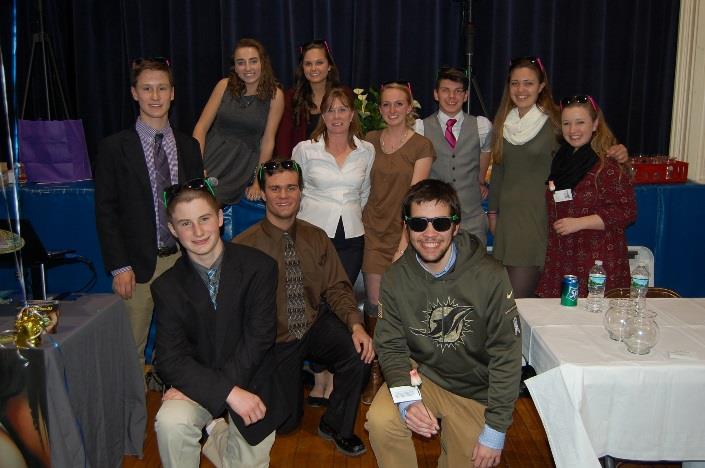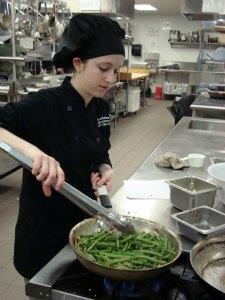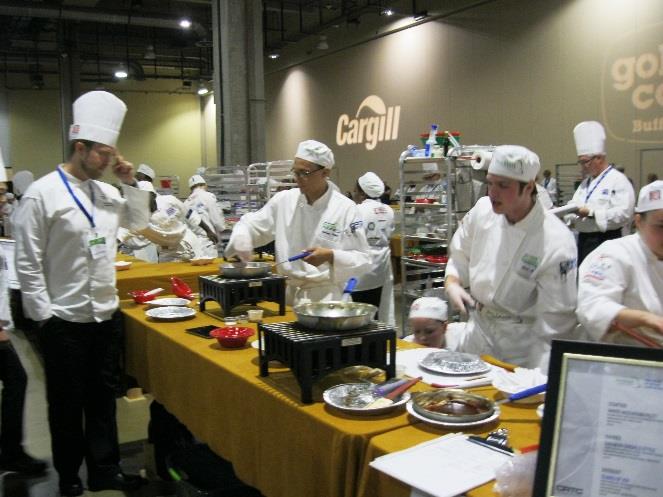Jun 6, 2016 | Article
There are many ways teachers and administrators at NH’s Career and Technical Centers help students make connections. At the Seacoast School of Technology (SST), “making connections” begins by teachers building relationships with middle-schoolers through Technology Fun Nights and SST Summer Camps.
At Technology Fun Nights, which run throughout the school year, students participate in events designed to get them excited about the fast-changing world of technology. Topics include everything from basic computer programming and animation to digital design, pre-engineering and more. In December, students will learn about the science, mathematics, engineering, and problem solving found in computer games.

According to Principal Margaret Callahan, these nights literally “sell out” in a matter of hours. “I have parents calling me the day after the last Technology Fun Night to sign up for the next one,” she said. “We have a waiting list of two pages and stop it there.”
Since starting these Technology Fun Nights in 2003, more than 3,500 students from the 5th through 9th grade have attended them. In helping students make connections to the larger community in which they live, they are also asked to bring a voluntary donation of three cans of food per person to donate to a local food bank.
At SST Summer Camps, which have taken place for the past six summers, Callahan said more than 700 students have participated in 15 different career camps. Programs offered this past summer included computer programming, an introduction to culinary arts, automotive engine basics, how to care for animals, and more.
“The summer camps sell out, too,” she said.” People have already started calling and parents line up with checks in hand the day registration opens.”
Morgan Leet ’16, Culinary Arts, Exeter High School, said her experience in SST’s Culinary Arts summer camp helped her find her passion. “Not only did I have a great time, but this experience really helped me decide that Culinary Arts is the path I want to take in my future,” she said. “I learned a lot in the kitchen and I was motivated to practice my skills at home and apply my knowledge.”
Leet’s involvement in SST’s programming did not stop there, however. “After attending the summer camp, I got involved in the SST mentor program and was able to learn even more about what is involved in the profession,” she said. “I also attended two of the SST Chef’s Table nights. Now that I am finally here as a student, I am ready to learn all that I can and I am very excited for a great year.”
Callahan credited “the vision and talents of [their] dedicated teachers” as instrumental toward helping students like Leet. “Many of our current students came to SST once upon a time as middle school students with only a vague idea of their future plans,” she said. “Today, their goals are more focused… We have a great school with generous teachers who offer great things to students of all ages.”
In looking ahead, Callahan said they look forward to expanding their programs as much as possible.
“We are teaching the skills people need to get jobs,” she added. “These programs are relevant and the payback is huge.”
To learn more, visit SeaCoastTech.com.

May 27, 2016 | Article
In April, the Seacoast School of Technology (SST) in Exeter held its 10th Annual Small Business Showcase, which has grown from 20 participating businesses in its first year to 80 businesses and more than 300 attendees.
According to Sandra Flannigan, SST Marketing Technologies Instructor, the purpose behind the showcase is for Marketing Technologies II students to use the skills they learn during their two years in class in a real-life scenario. She said another objective is to work with the Exeter Area Chamber of Commerce and Hampton Area Chamber of Commerce to bring businesses together from the Seacoast area and participate in business to business and business to customer marketing.
“Students start planning the event in December as their capstone project for Marketing Technologies II,” she said. “They use materials from previous years and work together as a group to make decisions on how they will run it this year. They are responsible for every aspect of the event. Students make many phone calls to get businesses to commit to attending, advertise for the event and they must solicit for door prizes as well.”
In planning the event, she said students break into four separate groups: Sponsorship, Logistics, Promotions and Marketing, and Exhibitor Relations. “They plan the menu and work with our Culinary Arts program to provide hors d’oeuvres,” she added. “They also needed to make sure the room is set-up perfectly and that everything runs smoothly.”
Flannigan said the best part about the event is that students actually plan and execute it, as she acknowledged she only works as an advisor if they have any questions. “They are free to change the event year to year so that it will be successful with their own spin on it,” she said. “Students learn how to work with others, gain leadership skills and experience all the details that go into planning a successful event.”

May 27, 2016 | Article
On April 21, HUOT Technical Center Hospitality students took first place in the 2016 Hospitality and Tourism Management Program (HTMP) State Invitational at the Grappone Conference Center in Concord. In addition to a trophy, individual medals and a $1,000 scholarship to their school’s HTMP program, each member of the team was awarded scholarship money to Johnson Whales University and the UNH Hospitality Management Program.
Emily Owens, Education Coordinator at the New Hampshire Lodging & Restaurant Association, referred to the event as “New Hampshire’s premier hospitality industry competition.”
“During this intense competition, participating teams demonstrate their knowledge of the hospitality industry by participating in five separate contests based on real life events and situations,” she said. “From room inspections and accounting night audits to a jeopardy like knowledge bowl, these students put their skills to the test.”
According to Owens, the competition includes the following:
- Room Inspection – Students must analyze a hotel room to find a specific number of “errors” made by the housekeeping department. Examples of “errors” are missing towels, trash not emptied, remotes not working, etc.
- Night Audit and Hotel Accounting Calculations – Students must complete a night audit for a fictional situation and guests. Students must also complete common hotel accounting calculations.
- Case Studies – Students must analyze and present solutions to three different case studies. The case studies focus on the areas of: Food and Beverage, Guest Services and Sales and Marketing. All three case studies are relative to the hospitality industry.
- Hospitality Project – Students are given basic information with specific parameters regarding size and budget and must plan an event from beginning to end. Students need to include a detailed menu, room layout, event timeline and completed BEO. Students will then “pitch” their event to the judges.
- Knowledge Bowl – The knowledge bowl is a jeopardy like contest where teams compete against each other, testing their knowledge of hospitality vocabulary.
As for the kinds of skills students learn within the program, Owens cited skills relative to the hospitality industry, specifically hotel and lodging, including guest services and operations, housekeeping, sales and marketing, and maintenance among others. Other skills include event planning and hospitality leadership skills, including operational and managerial skills.
“It is important for students to learn these skills so that we have educated and talented individuals heading into the hospitality industry,” she said. “The NH hospitality industry is a significant source of revenue to the state and is an ever growing industry. It is important that our schools continue to produce quality employees for the industry.”
<h4>About HTMP<h4
HTMP is a two-year school-to-career program developed by the American Hotel and Lodging Educational Institute (AHLEI). HTMP is designed to introduce high school juniors and seniors to careers in the hospitality industry. Through classroom activities, internships and comprehensive exams, students have the chance to earn national certification. For more information Click Here.

May 27, 2016 | Article
What differentiates a career and technical education program from traditional academic instruction is its emphasis on providing real world opportunities for students to demonstrate and apply their learning. At the Seacoast School of Technology (SST) in Exeter, this concept is seen in action nearly 7 days each week, as Culinary Arts students routinely plan for and execute meals for anywhere between 200 and 2,000 people.
According to Instructor James Collins, SST’s Culinary Arts Program differs from that at most other Career and Technical Schools around the Granite State. “The SST culinary arts kitchen is built with ‘scale’ in mind,” he said. “What scale enables and requires is a familiarity not only with various size, capabilities and differences in equipment, but also the math that goes along with it. Other important learning outcomes include timing and logistics.”
He cited the variety of ovens as one example of scale, as he noted the SST kitchen relies less on redundancy than some other kitchens, which enables students to learn in different ways.
“Ovens in the SST kitchen range from a simple deck oven used for pizzas—the current one is original to the beginning of the program—to a large combination convection oven, a conventional oven, steamers and a portable electric oven,” he said. “Having this level of choice causes the student to think strategically to match the job to the tool. It also prepares them some of the more advanced decision-making expected of an employee in a real-life application.”
He said what is equally significant about the SST kitchen is its work flow and set up.
“Our prep benches are unique and custom-designed and often emulated now,” he said. “We have 7 hand wash sinks to enable students to begin their lab assignments quickly, maximizing lab time. We have a commercial laundry setup designed to handle the multiple loads of laundry done each day. Our finishing line is better equipped than most local restaurants.”
In addition, he said their dining room is designed as a multi-purpose room with large capacity and two air walls to shrink the room to accommodate small groups he said it also has hookups for state-of-the-art audio visual technology.
SST’s state of the art kitchen is not the result of luck, however, but rather the result of an intentional planning process that began a couple years before the school’s renovation in 2008. According to Collins, committees were formed to conceptualize what SST would look like to the community in terms of programs offered, their scope and other relevant details.
“The instructors were encouraged to participate and use students and others, such as their advisory committees and outside stakeholders, to help ‘design’ their ideal learning/teaching environments,” he said. “In the case of culinary, I was fortunate to have a chef from UNH, Exeter’s Health Inspector, some other folks from the industry and students to help put together a plan for review.”
He said it was during these discussions that “scale” began to take shape as a way to differentiate SST’s Culinary Arts program from others in the state.
“Given the culinary interest in the Seacoast area, we wanted our students to be able to go out into industry prepared for what they would encounter in regard to food preparation techniques, presentation and service,” he added.

May 27, 2016 | Article
Competing for the first time in any ProStart competition, Concord Regional Technical Center Culinary students made it all the way to the National Invitation from April 29 to May 1 in Dallas, Texas. Placing 22nd out of 46 teams, the team had an incredible experience, according to Culinary Arts Student Chase Haines, who served as appetizer cook at the competition.
“It was great to work with such high-end chefs and to receive job opportunities from them as well as excellent critiques on our dishes,” he said. I think it’s safe to say, we all had an incredible time as a team at the Gaylord Hotel. We also got to hang out with a bunch of other teams from around the country.”
Despite it being their first time competing at such a high level, Chase said the entire team felt confident upon arrival. “We knew what we had to do and the only thing left was to execute it,” he added.
In summing up the team’s performance at the nationals, Bob McIntosh, Chef Instructor at Concord Regional Technical Center, applauded their hard work and determination in just getting there. He said they also responded quite well to adversity in the competition itself.
“At one point, they were 13 minutes behind their normal timing, but pulled together as a team and were able to make up all but 1 and a quarter minutes,” he said. “The judges’ critiques were very favorable in all segments, including telling them that they aced the recipe and costing book.”
Noting it is unusual for a school to enter a ProStart Competition and compete well enough to go to the nationals, McIntosh commended the students’ work ethic and passion for food. He also cited the structure of the ProStart competition format at the state, regional and national levels as noteworthy.

“All of the competitions were well run and staffed by professionals who gave the students very informative critiques, taking time to teach and mentor as well as judge,” he explained. “We had lots of support from many chefs as well as industry mentor, Chef Gary Sheldon. It was also very helpful that the NHLRAEF and the sponsors were able to finance most of our trip to Texas.”






